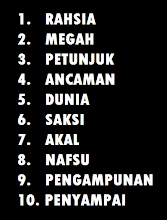Segala kekalutan dalam negara ini semakin memuncak dibawah pentadbiran mamak kutty mahathir. Perubahan yang dilakukannya mempunyai serampang dua mata. Gerakan kotor ini tidak dapat dibaca oleh orang Melayu ketika itu akibat kekurangan maklumat dan terhad.
Tapi kini keadaan telah berubah dengan kemajuan teknologi tanpa sempadan...
PETALING JAYA, April 20 — The interfaith tension in Malaysia has been partly heightened by a change in the country’s supreme law and a policy backed by former prime minister Tun Dr Mahathir Mohamad almost two decades ago, academic Dr Maznah Mohamad said today.
Tracing today’s problems in relations between Muslims and non-Muslims to the 1990s when Malaysia experienced major “structural changes”, Maznah cited the creation of a parallel system of two “powerful” courts and the centralisation of the administration of the Islamic religion.
Maznah pointed to the amendment of the Federal Constitution, saying the introduction of Article 121 (1A) in the 1990s “created” a “parallel legal structure” of civil courts and Shariah courts.
“There was a constitutional amendment which actually gave powers to the Shariah court system to make it be of equal standing to the other court system that we used to have,” the associate professor with the National University of Singapore (NUS) told a discussion at the Malaysia Forum 2014 here today.
Although the Federal Constitution does not provide for the centralised governing of Islam, Maznah said Dr Mahathir backed such a move, leading to the creation of the “powerful” Department of Islamic Development Malaysia (Jakim) which she described as a “superministry of Islamic affairs”.
“Why did that centralisation happen? I would kind of attribute it to Mahathir’s policy of wanting to control, to manage as well to make sure Islam does not become too big.
“It’s a kind of calibration-type of policy where you give powers but at the same time also control the rise of Islam. So to do that he centralised the administration of Islam,” she said.
Although Dr Mahathir elevated the state religious departments’ status, Maznah said in reality, Putrajaya’s Jakim “sets the tone” for the state bodies, while the Attorney-General’s Chambers (AGC) has a department dedicated to the drafting of new shariah laws to be passed by state governments.
Maznah argued that these two changes provided the “moral” and “legal authority” for those alleged to be raising tension, such as when a Muslim convert finds he is bound by the Shariah court and has the moral backing to convert the children from a non-Muslim marriage to Islam.
“So you see there are both legal and moral authorities being used on these kind of cases, and this kind of exaggerates the conflict. Because actually the legal system does not have a solution to this problem, it has just created more problems as you can see because of the separation at the cultural, ideological, political level, then it becomes a racial issue, understandably so and people don’t know how we can get out of this situation.”
“If we want to correct the system, we have to address those structural factors which have created the kind of conundrum that we are in today,” she said.
Dr Mahathir was prime minister from 1981 to 2003, the longest in Malaysia’s history.
According to Jakim’s official website, the federal Islamic authority was formed on January 1, 1997 to replace the Islamic Affairs Division (BAHEIS); the latter was preceded by the Religious Division in the Prime Minister’s Department.
Article 121 (1A) was inserted into the Federal Constitution in 1988.
Dr Maznah is attached to both NUS’s Department of Malay Studies and its Department of Southeast Asian Studies.
She was one of four speakers discussing “Race and religion in Malaysia — what lies ahead” in a session moderated by social activist Ahmad Fuad Rahmat from Projek Dialog.
The other speakers were PAS Research Centre executive director Dr Dzulkelfy Ahmad, former Malaysian Muslim Lawyers Association (PPMM) deputy president Haniff Khatri Abdulla and human rights activist and lawyer Honey
Tan Lay Ean.
Sumber: my.news.yahoo
SANTAI
-
-
-
-
-
-
-
-
-
VVD2 years ago
-
-
Waktu Hilangnya Islam - Ustaz Wadi Annuar3 years ago
-
-
Jawatan Kosong Toyota Capital Malaysia6 years ago
-
Hello world!6 years ago
-
-
-
NABI SAW TIDAK BOLEH MEMBACA?7 years ago
-
-
-
-
-
-
-
-
-
Menu :
PR
-
-
-
-
-
-
-
-
-
Lebai dan pertimbangannya9 years ago
-
UMNO
-
-
-
-
APA PADA NAMA3 years ago
-
-
-
-
-
-
Sedia Berkhidmat Selagi Diperlukan - PM7 years ago
-
-
RAKYAT BAKAL MENGEMIS JIKA...10 years ago
-
BERFIKIR BERLANDASKAN AL-QURAN, SUNNAH, HADIS DAN SIRAH RASULULLAH SAW
-
-
-
-
-
-
-
-
-
Marquez sambar petak pertama11 years ago
-
-
-
-
MINDA BARAT
-
-
-
-
-
After Dark Funny Meme Dump 40 Pics1 year ago
-
“Cheetos” For Families in Need3 years ago
-
-
How’s your 2019 going?6 years ago
-
-
-
Design by FThemes |Published By Gooyaabi Templates | Blogger Theme by Lasantha - Premium Blogger Templates | NewBloggerThemes.com




























